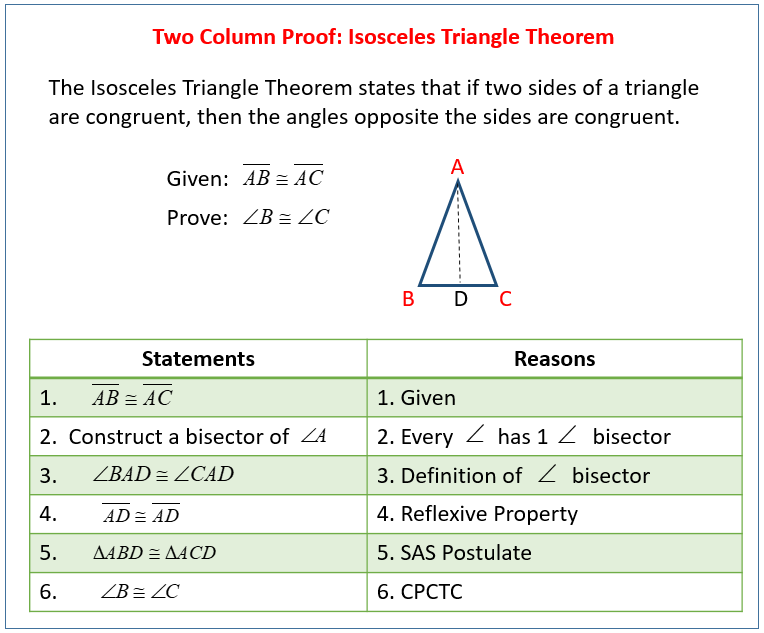Two Column Proofs
Related Pages
Geometry Proofs
Geometry Lessons
In these lessons, we will learn how to use two column proofs for geometric proofs.
A two-column proof consists of a list of statements, and the reasons why those statements are true. The statements are in the left column and the reasons are in the right column. The statements consists of steps toward solving the problem.
The following figure gives a Two-column Proof for the Isosceles Triangle Theorem. Scroll down
the page for more examples and solutions.

How To Use The Two-Column Proof To Prove The Isosceles Triangle Theorem? Click here
How To Use The Two-Column Proof To Prove The Exterior Angle Theorem? Click here
How To Use Two Column Proof To Show Segments Are Perpendicular? Click here
How To Use Two Column Proof To Prove Parallel Lines? Click here
How To Use Two Column Proof To Prove a Quadrilateral is a Parallelogram? Click here
How to Write a Two-Column Proof?
- Understand the Problem: Carefully read and understand what you are trying to prove. Identify the given information and the statement you need to reach as the conclusion.
- Draw a Diagram (if applicable): A visual representation of the problem can often help you see the relationships between different elements. Label the diagram with the given information.
- Start with the Given Information: The first statement(s) in your proof should be the information that is provided in the problem. The reason for these statements is “Given.”
- Use Logical Reasoning: Apply definitions, postulates, theorems, and properties to make logical deductions from the given information and subsequent statements. Each deduction will be a new statement in your proof, and the reason will be the rule or fact that justifies that statement.
- Work Towards the Conclusion: Continue making logical deductions until you arrive at the statement you were asked to prove. The final statement of your proof should be the conclusion.
- Review and Verify: Once you have completed the proof, review each step to ensure that the statements are logical and the reasons are valid and accurately support the statements.
Common Reasons Used in Proofs
Given: Information provided in the problem.
Definitions: E.g., “Definition of midpoint."
Postulates: E.g., “Segment Addition Postulate."
Theorems: E.g., “Vertical Angles Theorem."
Algebraic Properties: Substitution, Addition, Subtraction, etc.
Two-Column Proof (5 steps) Practice 1
Practice writing a 2 column proof.
Example:
Given AD = 8, BC = 8, B̅C̅ ≅ C̅D̅
Prove: A̅D̅ ≅ C̅D̅
Two-Column Proof (7 steps) Practice 2
Practice writing two column proofs.
Example:
Given D̅E̅ ≅ F̅G̅
Prove: x = 4
Proof Practice (5 steps) Practice 3
Practice writing two column proofs.
Example:
Given MN = PQ
Prove: MP = NQ
Practice Proof 4 (Use angle addition postulate)
Practice writing 2 column proofs.
Example:
Given m∠RPS = m∠TPC, m∠TPV = m∠SPT
Prove: m∠RPV = 3(m∠RPS)
How To Use The Two-Column Proof To Prove The Isosceles Triangle Theorem?
The Isosceles Triangle Theorem states that if two sides of a triangle are congruent, then the angles opposite the sides are congruent.
How To Use The Two-Column Proof To Prove The Exterior Angle Theorem?
The Exterior Angle Theorem states that the sum of the remote interior angles is equal to the non-adjacent exterior angle.
How To Use Two Column Proof To Show Segments Are Perpendicular?
Use the SSS, SAS, ASA, AAS postulates.
Using triangle congruency postulates to show that two intersecting segments are perpendicular.
(Diagonals of a kite)
How To Use Two Column Proof To Prove Parallel Lines?
Given ∠2 ≅ ∠1 ≅ ∠3
Prove: A̅B̅ || C̅D̅
Proving A Quadrilateral Is A Parallelogram | Geometry Proof
This video geometry lesson proves two parallelogram theorems using the two column proof.
Proof 1:
If the diagonals of a quadrilateral bisect each other, then the quadrilateral is a parallelogram.
Proof 2:
If both pairs of opposite sides of a quadrilateral are congruent, then the quadrilateral is a
parallelogram.
Theorems Used: If both pairs of opposite angles of a quadrilateral are congruent, then the
quadrilateral is a parallelogram and If one pair of opposite sides of a quadrilateral is both
congruent and parallel, then the quadrilateral is a parallelogram to solve problems.
Special Parallelograms - Rhombus And Rectangle Proofs
This video uses the two column method to prove two theorems.
Proof 1:
The diagonals of a rectangle are congruent. This amounts to be a triangle proof to use CPCTC.
Proof 2:
The diagonals of a rhombus are perpendicular.
Try out our new and fun Fraction Concoction Game.
Add and subtract fractions to make exciting fraction concoctions following a recipe. There are four levels of difficulty: Easy, medium, hard and insane. Practice the basics of fraction addition and subtraction or challenge yourself with the insane level.

We welcome your feedback, comments and questions about this site or page. Please submit your feedback or enquiries via our Feedback page.